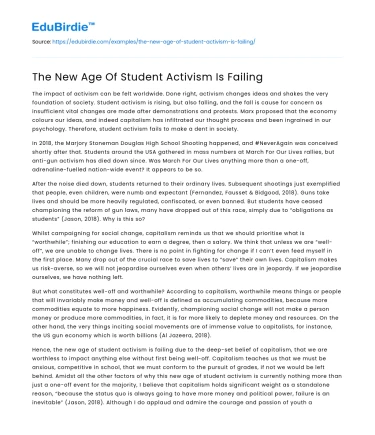The impact of activism can be felt worldwide. Done right, activism changes ideas and shakes the very foundation of society. Student activism is rising, but also falling, and the fall is cause for concern as insufficient vital changes are made after demonstrations and protests. Marx proposed that the economy colours our ideas, and indeed capitalism has infiltrated our thought process and been ingrained in our psychology. Therefore, student activism fails to make a dent in society.
In 2018, the Marjory Stoneman Douglas High School Shooting happened, and #NeverAgain was conceived shortly after that. Students around the USA gathered in mass numbers at March For Our Lives rallies, but anti-gun activism has died down since. Was March For Our Lives anything more than a one-off, adrenaline-fuelled nation-wide event? It appears to be so.
Save your time!
We can take care of your essay
- Proper editing and formatting
- Free revision, title page, and bibliography
- Flexible prices and money-back guarantee
After the noise died down, students returned to their ordinary lives. Subsequent shootings just exemplified that people, even children, were numb and expectant (Fernandez, Fausset & Bidgood, 2018). Guns take lives and should be more heavily regulated, confiscated, or even banned. But students have ceased championing the reform of gun laws, many have dropped out of this race, simply due to “obligations as students” (Jason, 2018). Why is this so?
Whilst campaigning for social change, capitalism reminds us that we should prioritise what is “worthwhile”; finishing our education to earn a degree, then a salary. We think that unless we are “well-off”, we are unable to change lives. There is no point in fighting for change if I can’t even feed myself in the first place. Many drop out of the crucial race to save lives to “save” their own lives. Capitalism makes us risk-averse, so we will not jeopardise ourselves even when others’ lives are in jeopardy. If we jeopardise ourselves, we have nothing left.
But what constitutes well-off and worthwhile? According to capitalism, worthwhile means things or people that will invariably make money and well-off is defined as accumulating commodities, because more commodities equate to more happiness. Evidently, championing social change will not make a person money or produce more commodities, in fact, it is far more likely to deplete money and resources. On the other hand, the very things inciting social movements are of immense value to capitalists, for instance, the US gun economy which is worth billions (Al Jazeera, 2018).
Hence, the new age of student activism is failing due to the deep-set belief of capitalism, that we are worthless to impact anything else without first being well-off. Capitalism teaches us that we must be anxious, competitive in school, that we must conform to the pursuit of grades, if not we would be left behind. Amidst all the other factors of why this new age of student activism is currently nothing more than just a one-off event for the majority, I believe that capitalism holds significant weight as a standalone reason, “because the status quo is always going to have more money and political power, failure is an inevitable” (Jason, 2018). Although I do applaud and admire the courage and passion of youth activists, the odds are simply stacked against them in making a permanent dent in the legislation.
“Philosophers until now have only interpreted the world in various ways. The point, however, is to change it.” (Marx & Engels, 1942). Unfortunately, however hard student activists are trying to change the capitalist world, “the mode — the most common outcome — “is that activism doesn’t work.”” (Jason, 2018). Marx was right, capitalism has even crept into and corrupted the more humane side of society — activism.






 Stuck on your essay?
Stuck on your essay?

